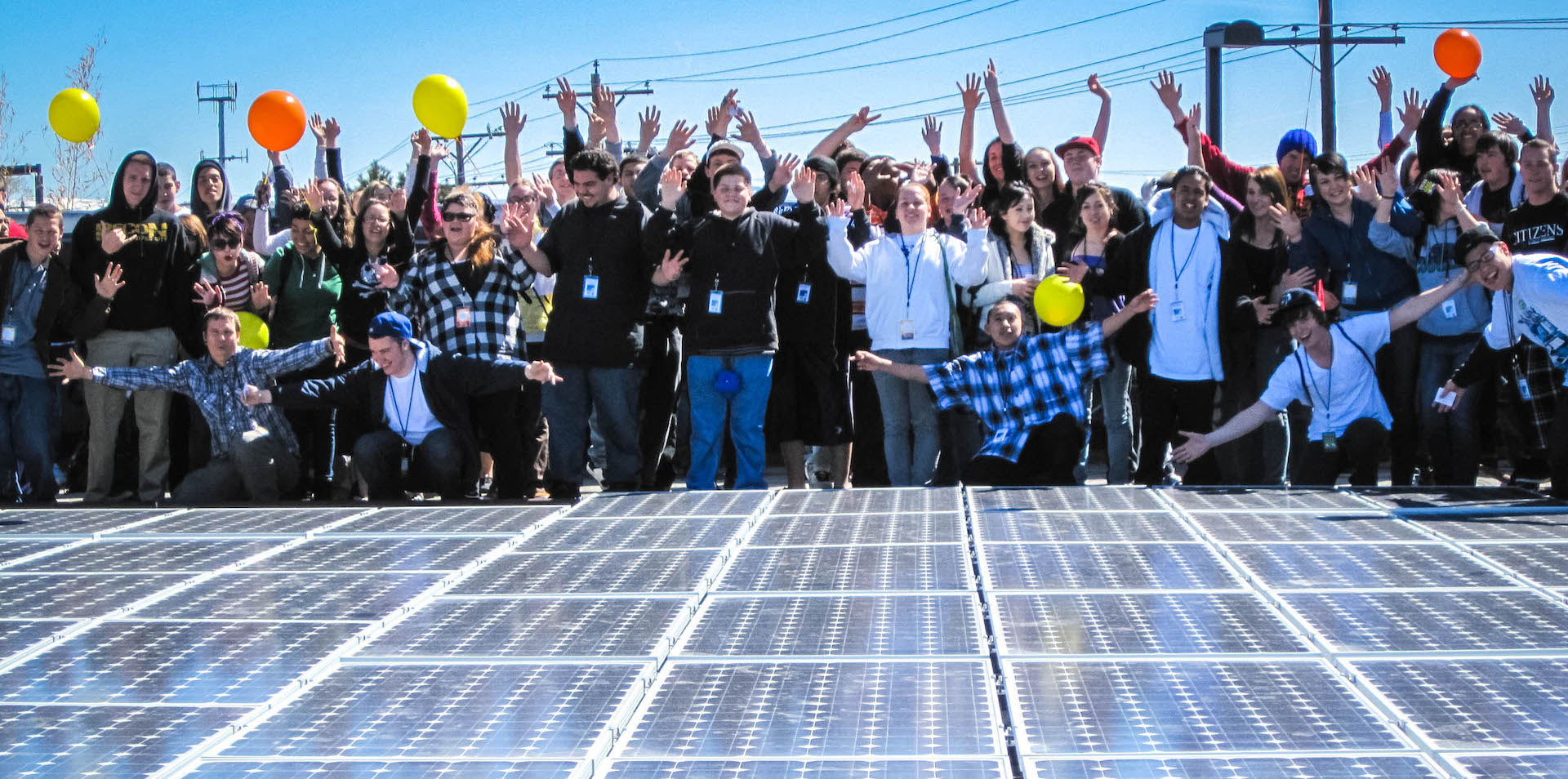The EU institutions have agreed on a new 2030 Renewable Energy Directive. Josh Roberts explains the new opportunities for Europe’s community energy movement.

European energy cooperatives have reasons to celebrate after the new EU renewable energy directive (Photo by Black Rock Solar, modified, CC BY 2.0)
There is currently a lack of political leadership on renewables in Europe. Europe’s 2030 ambition for renewables has just been agreed, but it is far from where it should be. Despite figures demonstrating that costs for renewables continue to drop, most EU Member States have stubbornly focused on maintaining a European target that is now below business as usual.
The German government, the Originator of the Energiewende, currently looks more like a boat drifting aimlessly at sea, failing to deal with its own internal energy politics, and creating problems on the European scene. It may even try to torpedo the agreement reached between the European Parliament and the Council.
However, this story overlooks a small but key player: the European citizen. Before Germany thought up its Energiewende and Denmark outlawed nuclear, it was citizens that built the first wind turbines. They did so through cooperatives, or ‘renewable energy communities’ as they are now called with the likely conclusion of the new Renewable Energy Directive.
Even without formal recognition at European level, and with limited support in certain Member States, since the 1970s community energy has grown into a movement. Yet, this movement has been under stress, in particular due to the development of more market-based mechanisms for renewables, such as auctions and tenders, and without acknowledgment of energy communities. If this continues, the energy transition will face major growing pains moving forward.
Therefore, June 14 2018 marks an important milestone in the energy transition: when the EU agreed to acknowledge energy communities and citizens, give them a concrete set of rights, and ensure the development of enabling frameworks at national level.
The agreement still needs to be formalised. Nevertheless, some important elements can already be identified:
Acknowledgment
In order to provide energy communities with support through an enabling framework, it was always going to be necessary to get the definition right. The challenge was to agree on a definition flexible enough to allow for different configurations consistent with various national laws, while also ensuring the definition was not so broad that it could be abused by larger energy companies looking to rebrand or gain a competitive disadvantage.
Largely, this balance has been achieved. The renewable energy community definition ensures that they are autonomous – both internally to ensure democratic governance, and externally to ensure communities are not beholden to outside company interests. The definition also ensures local control, that they are open for any local citizen to participate, and that they are primarily aimed at providing community or local benefits rather than financial profits.
Lastly, renewable energy communities are open to local authorities, creating up new opportunities for collaboration between local governments and citizens.
New rights and enabling frameworks
The new Renewables Directive will also include rights and provisions to support development of enabling national frameworks for renewable energy communities.
First, every final consumer will have a right to participate in a renewable energy community without worrying whether they will keep their traditional consumer rights.
Member States will also be required to assess the potential and the existing barriers to the development of energy communities. From this assessment, they will need to develop frameworks that allow communities to access markets without discrimination and on a level playing field.
Renewable energy communities will also have a right to set up energy sharing arrangements. Member States will need to ensure citizens that are vulnerable or energy poor benefit from participating in a renewable energy community, and that public authorities get proper support to participate. Lastly, Member States must put in place tools to facilitate access to finance and information – two key impediments for new renewable energy communities.
Access to renewables support schemes
The biggest threat for renewable energy communities is the development of auctions and tenders for new renewables installations. There is much evidence that competitive bidding is not appropriate for smaller market actors, in particular renewable energy communities.
The Renewables Directive will not solve this problem. However, it will require Member States to take the specificities of renewable energy communities into account when designing their support schemes. Therefore, there is an opportunity for renewable energy communities to advocate to their governments that they be able to access support on a level playing field with traditional energy companies.
The next big fight will come with the revision of the Commission’s State aid Guidelines. Gaining further recognition for energy communities under the new post-2020 guidelines will be essential to ensure they have equitable access to available renewable support schemes moving forward.
Where do we go from here?
The new Renewable Energy Directive does not solve all problems and there are a lot of unanswered questions. However, we have come a long way since this process started. Virtually overnight, energy communities have gone from having no explicit status to obtaining an important basis for participating in Europe’s energy transition.
If and where national governments fail to lead, citizens are ready to take the reigns. For the first time, they are now backed by European law. However, now they need the support of their national governments. Continued support from some of the first movers in citizen energy, especially Germany, wouldn’t hurt either.
Josh Roberts serves as Advocacy Officer of REScoop.eu, a federation that represents citizen cooperative and energy initiatives around Europe that work on renewable energy, energy efficiency, and other clean energy technologies. He is in charge of coordinating REScoop.eu’s input into the negotiations on the EU’s clean energy package legislation.